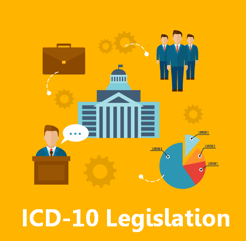ICD-10 Eyecare Industry News: Legislation vs Proposed Ruling
With ICD-10 set to hit in just a few months, the topic of ICD-10 has been getting heavy press coverage, and you might have seen a couple of articles about new rulings and proposed rules. It can get a little complicated, but it’s important to know the facts and differentiate between rules that have been passed and rules that are just being proposed. We’re here to lay out the facts and answer three common questions with a yes, no, and maybe.
ICD-10 Eyecare Industry News: Yes, No, Maybe

Will the ICD-10 compliance deadline be extended beyond October 1, 2015? NO.
In 2014, the compliance date got pushed back a year, but it is very unlikely that it will happen again this year. Your ICD-10 implementation should not be undertaken with the assumption that an extension will be granted. The Department of Health and Human Services (HHS) has no plans to extend the compliance date for implementation of ICD-10, and therefore, you should plan to complete the steps required to implement ICD-10 on October 1, 2015.
Do we get more flexibility when coding with ICD-10? YES.
It’s important to be specific in your documentation, even if you’re using an EHR. Adding more details during the exam will enable the system to generate the proper code. You should start getting into the habit of adding specific documentation as soon as possible. But the CMS does offer some flexibility.
For one year after October 1, 2015, Medicare will not deny claims “based solely on the specificity of the ICD-10 diagnosis code” as long as the provider used a valid code “from the right family.” What this all means is that Medicare will not deny payment for unintentional errors. And Medicare claims will not be “audited based on the specificity of the diagnosis codes as long as they are from the appropriate family of codes.” This transition period will give your practice more time to get up to speed with ICD-10 coding.
Is dual coding allowed past October 1, 2015? MAYBE... but don’t count on it!
There’s been no shortage of ICD-10 legislations trying to make the switch easier on physicians all over the country. So you might have heard of the latest proposal to allow dual coding of ICD-9 and ICD-10 codes for the first six months after the transition.
This ruling has yet to pass, but the CMS has repeatedly stated that its claims processing systems are not capable of accepting ICD-9 and ICD-10 codes at the same time. It will be a costly decision, and many industry leaders have stepped out to voice their concerns about the ramifications of this ruling.
As of now, the CMS has been very firm on the October 1, 2015 deadline. More proposed ruling to delay compliance will be expected, but we recommend being fully prepared for the transition.
We’ll be keeping up with more ICD-10 industry news, so to stay informed, subscribe to the VisionWeb blog and get blog notifications sent straight to your inbox.

